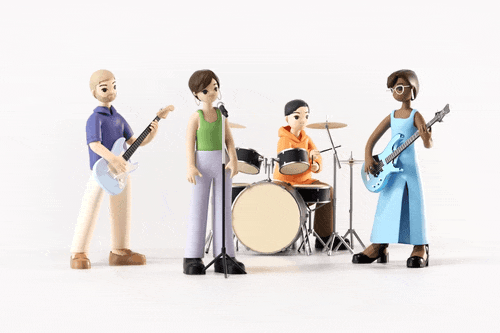How community transforms music learning
There's something undeniably special about connecting with other musicians. Sharing your passion, learning from each other, and growing together can make the journey of mastering a musical instrument even more fulfilling. But did you know that being part of a community can also have a significant positive impact on your music learning? A number of studies have shown the importance of community in music education and practice.

Learning better together
As highlighted in Lucy Green's "How Popular Musicians Learn: A Way Ahead for Music Education" [1], music learning is not just about mastering your instrument, the music, or techniques. The development of musical friendships and alliances plays a vital role in the learning process. By fostering relationships and connections with like-minded individuals, musicians can learn better and faster, enhancing their growth and progress.
Unique online experiences
Technology has given musicians access to communities that support informal learning and skill development [2]. Online spaces create new opportunities for sharing knowledge, resources, and feedback. These settings, where musicians come together and learn from one another, can be just as valuable for skill development as formal music education [1]. Studios on Tonic are a great example of how informal spaces can enable unique ways of sharing. By letting musicians share their practice live, others can give feedback in a really timely and supportive way.
Motivation through belonging
A music community provides individuals with a sense of belonging, which can be really motivating in the learning process [3]. Feeling a part of a supportive group can make a big difference; it can help musicians stay on the learning journey much longer, and empower them to strive for greater achievements.
Expanding perspectives
Learning within a community can expose you to a wider range of viewpoints and opportunities. As Lucy Green explains, "Learning within a community can provide musicians with diverse perspectives, challenges, and resources that can lead to a richer and more well-rounded understanding of music"[1]. Exposure to various musical styles, techniques, and cultures can expand a musician's knowledge and skills, ultimately improving their musical growth and development.
Are you looking for deeper, more fun, and motivating ways to learn music? Connect with close music friends, find local musicians, or discover Groups on Tonic – you might be surprised by how much it can elevate your learning experience ✨
References:
[1] Green, L. (2001). How Popular Musicians Learn: A Way Ahead for Music Education. Ashgate Publishing, Ltd.
[2] Ruthmann, S. A., Hebert, D. G., & Lee, C. Y. (2009). Online Music Communities for Learning, Collaboration, and Motivation. International Journal of Education & the Arts, 10(3).
[3] McPherson, Gary E., and O'Neill, Susan A. "The Role of Motivation in the Development of Musical Expertise." In The Oxford Handbook of Music Education, Volume 1, edited by Gary E. McPherson and Graham F. Welch. Oxford: Oxford University Press, 2012, pp. 143-155.
